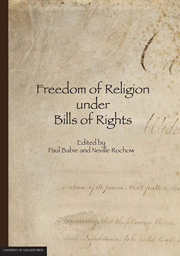Book contents
- Frontmatter
- Contents
- Acknowledgments
- List of Contributors
- Foreword by The Hon Sir Anthony Mason AC KBE: Human Rights and Courts
- INTRODUCTION
- SETTING THE SCENE
- 2 How Religion Constrains Law and the Idea of Choice
- 3 Is the Emperor Wearing the Wrong Clothes? Human Rights and Social Good in the Context of Australian Secularity: Theological Perspectives
- 4 Anniversary Overlap: Or What happens when St Paul Meets the Universal Declaration of Human Rights
- CONTEMPORARY FREEDOM OF RELIGION ISSUES
- COMPARATIVE EXPERIENCE WITH FREEDOM OF RELIGION
- TABLE OF LEGISLATION AND INTERNATIONAL INSTRUMENTS
- INDEX
4 - Anniversary Overlap: Or What happens when St Paul Meets the Universal Declaration of Human Rights
from SETTING THE SCENE
Published online by Cambridge University Press: 05 June 2013
- Frontmatter
- Contents
- Acknowledgments
- List of Contributors
- Foreword by The Hon Sir Anthony Mason AC KBE: Human Rights and Courts
- INTRODUCTION
- SETTING THE SCENE
- 2 How Religion Constrains Law and the Idea of Choice
- 3 Is the Emperor Wearing the Wrong Clothes? Human Rights and Social Good in the Context of Australian Secularity: Theological Perspectives
- 4 Anniversary Overlap: Or What happens when St Paul Meets the Universal Declaration of Human Rights
- CONTEMPORARY FREEDOM OF RELIGION ISSUES
- COMPARATIVE EXPERIENCE WITH FREEDOM OF RELIGION
- TABLE OF LEGISLATION AND INTERNATIONAL INSTRUMENTS
- INDEX
Summary
In 2007, Paul Gray, a columnist for the Melbourne Herald Sun, vented his spleen against the Australian Catholic Film Office and the Australian Film Institute for the awards given to Rolf de Heer's film Ten Canoes. His reason: the film's subtitles. Australian money, he argued, was fritted away on a film that was not in the ‘national language’. He went on to claim that this made the film ‘elitist’, ‘baffling’, ‘high-minded’, its awards being a case of ‘the unsociable rushing to laud the unwatchable’. The Jesuit Father Richard Leonard's rationale for the ACFO award was that it ‘can only be a useful instrument for reconciliation’. In contrast, Gray queried whether any reconciliation was possible. For him, reconciliation was tied to the universality of English at least as defined with an Australian frame of reference, or even broader, movies as ‘the business of the masses’. Drew Roberts, from the Adult Multicultural Education Services in Melbourne, underscored the significance of Australia's first Indigenous language (Ganalbingu) film in a context where only 18 of 128 extant Indigenous languages are currently exempt from the threat of extinction. Death and loss have already severely decimated the 500 dialects and 250 languages estimated to have layered the great southern land before white settlement. Gray at least acknowledged that he was a ‘white guy’ but what he did not acknowledge was that white guys who speak English are presumably the measure of universality.
- Type
- Chapter
- Information
- Freedom of Religion under Bills of Rights , pp. 51 - 62Publisher: The University of Adelaide PressPrint publication year: 2012

